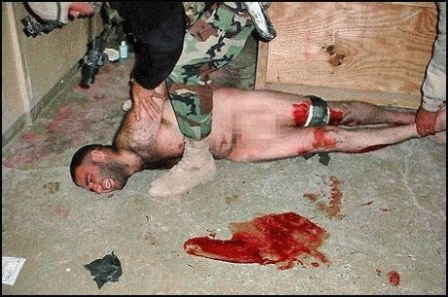In an interview with Harper's magazine last year, Mayer said Helgerson "investigated several alleged homicides involving CIA detainees" and forwarded several of those cases "to the Justice Department for further consideration and potential prosecution."
CIA Inspector General John Helgerson raised concerns in a 2004 top-secret report his office prepared about the legality of the interrogation techniques agency interrogators used against admitted 9/11 mastermind Khalid Sheikh Mohammed.
Now, thanks to the release last week of four Justice Department "torture" memos Helgerson's concerns make sense.
In a footnote to a May 30, 2005 memo issued by Steven Bradbury, the acting head of the Justice Department's Office of Legal Counsel, Mohammed was waterboarded 183 times in March 2003, the same month he was captured. The of times Mohammed was waterboarded was first reported by blogger Marcy Wheeler over the weekend.
Another footnote said that "in some cases the waterboard was used with far greater frequency than initially indicated" and with larger quantities of water than permitted under written guidelines.
Both footnotes directly reference Helgerson's report and the memo, along with two others issued by Bradbury in May 2005, appears to address specific conclusions Helgerson's report raised questions about the legality of the "enhanced interrogations."
According to the Times report, Helgerson's investigation into the CIA's "enhanced interrogation" program, launched in 2003, "expressed skepticism [that] the [torture] treaty does not apply to CIA interrogations because they take place overseas on people who are not citizens of the United States."
"The officials who described the report said it discussed particular techniques used by the CIA against particular prisoners, including about three dozen terror suspects being held by the agency in secret locations around the world," the New York Times reported.
"They said it referred in particular to the treatment of Khalid Sheikh Mohammed...who has been detained in a secret location by the CIA since he was captured in March 2003. Mr. Mohammed is among those believed to have been subjected to waterboarding, in which a prisoner is strapped to a board and made to believe he is drowning."
The report has been highly sought after by members of Congress and civil liberties organizations for some time. It is believed contents of the report were shared with Democratic and Republican members of the House and Senate intelligence committees.
In fact, a little known declaration from the Justice Department in January makes that clear. The declaration, made in response to a lawsuit filed against the CIA by the American Civil Liberties Union over the destruction of 92 interrogation videotapes, says "at the conclusion of [Helgerson's] special review in May 2004, [CIA Office of Inspector General] notified DOJ and other relevant oversight authorities of the review's findings."
In June 2004, one month after Helgerson concluded his investigation, then CIA Director George Tenet asked the White House to explicitly sign off on the agency's "enhanced interrogation" program with a memo that authorized specific techniques, such as waterboarding. A similar request was also made by the agency at the start of Helgerson's probe in 2003, according to a report published in the Washington Post last October.
"The Bush administration issued a pair of secret memos to the CIA in 2003 and 2004 that explicitly endorsed the agency's use of interrogation techniques such as waterboarding against al-Qaeda suspects -- documents prompted by worries among intelligence officials about a possible backlash if details of the program became public," the Post reported.
"The classified memos, which have not been previously disclosed (and remain classified), were requested by then-CIA Director George J. Tenet more than a year after the start of the secret interrogations, according to four administration and intelligence officials familiar with the documents. Although Justice Department lawyers, beginning in 2002, had signed off on the agency's interrogation methods, senior CIA officials were troubled that White House policymakers had never endorsed the program in writing."
(Note: You can view every article as one long page if you sign up as an Advocate Member, or higher).





